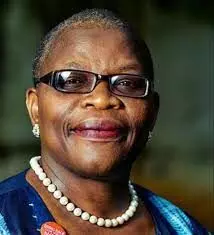- Home
- /
- Trending-News
- /
- Ezekwesili suggests...
Ezekwesili suggests how Africa can best attain economic devt

A former Minister of Education, Dr. Oby Ezekwesili, has stressed the need for a change in political culture in Africa to achieve meaningful development for the continent.
Ezekwesili made the recommendation at the matriculation ceremony of the 2023–2024 session of the School of Politics, Policy, and Governance (SPPG) in Abuja on Saturday.
She said that there was a dominant political culture across Africa that subordinated the common good to narrow interests.
Ezekwesili, who is the founder of the school, said “finding solutions to the quality of politics and economic performance of Nigeria was her reason for establishing the school”.
She said that the school was designed to correct the abnormality on the supply side of the market for politics and democracy.
According to her, “we have low-cost leadership in our politics today, and you cannot produce anything from low-cost leadership.”
She said that young people and technology would propel Africa forward, saying, however, that politics and governance processes represent a major stumbling block.
“To correct these, we need to design a new pipeline that would contest against this monopoly political class that has a dominant culture.
“You can cry as loud as the next National Assembly; if filled with the same existing pipeline of political players, lawmakers will still buy new sets of Sport Utility Vehicles (SUVs).
“The next set of executives, even at the state and local government levels, will carry on with the same; nothing will change.
“You are a response to this hopelessness; you are the ones that will change it; we need a critical mass of people thinking with a mindset of service to the country and to the people at all levels.
“It is not about you; it cannot be about you; you represent an answer to the most significant answer to our problem as a continent.
“We are in a place of competent anger that pushes you to design solutions; you have to be purposeful and intentional,” she said.
In his remarks, Prof. Wale Suleman, the guest speaker at the event, said democracy does not work in Africa because the people do not really participate.
Suleman, a neurosurgeon, said that democracy is a system of government for all eligible citizens represented in the executive, legislature, and judiciary.
According to him, vision, capability, ability, and capacity are expected of the executive, as are servants and selfless leaders with higher moral values to represent the people.
The neurosurgeon said that the independence of the judiciary and the legislature was not negotiable, saying that was not the case in practise in Nigeria.
He said that democracy had moved to a selective process rather than an elective process in Nigeria, as “we now have godfathers without true representative democracy”.
According to him, money politics where power go to the highest bidder, has become the order of the day, stressing the need to move from naira politics to nation-building ideology politic
“A lot of things are not working in Nigeria because the processes are broken and nobody is doing anything to fix it.
“This is why I am very impressed with my school, SPPG; we need to transition from godfathers to people-focused democracy.
“Political a-party of the people leads to poor representation; the elites, academics, the youth, and all of you here need to get involved; democracy does not work without the participation of the populace.
“Formal and informational education is fundamental to nation-building; the reorientation of our people is very critical,” he said.
Suleman said that there was a need to read the lives of the heroes who voted for Nigeria’s independence in 1959 and move away from worshipping corrupt leaders.
The professor urged the students to study hard to become drivers of the economy and be watchful not to emulate conquerors.
“It is up to the youth to change our society. It is difficult. It is going to be challenging; there will be people who will say, ‘you cannot do this'. Remember, impossibility is just a word; success is first achieved in the head.
“Once you are committed and willing to put in the work, nothing can stop you; you have to grow and aim high, and let us not be conquered by a minority group that sees themselves as colonial masters.
“Democracy is a way to transition Nigeria in the right direction; we are all critical stakeholders, and I wish all the students a successful journey,” he said.
Earlier, the Vice Chancellor of the Institution, Dr. Alero Ayida-Otobo, said SPPG is an unconventional school that runs for 10 months, from November to August.
She said that there are a total of 300 students for the 2023–2024 session, drawn from different walks of life with various aims and objectives.
“There are some individuals who have intentions to run for public office; that includes positions such as President, Governors, Senators, House of Representatives, State Houses of Assembly, Councillors, and Local Government Area chairpersons.
“There are those who are interested in working within the government as policymakers, ministers, support staff, or special advisers to elected officials.
“There are individuals who provide consulting services related to politics and policy to those in government and civil society.
“There are professionals who work in the private or non-profit sectors, particularly in the media industry, finance, legal, healthcare, education, and so on, who interface with the government.
“There are individuals who aspire to be effective advocates and engaged citizens and want to become skilled in engaging with the government,” she said.
Ayida-Otobo urged the students to take their programmes very seriously, saying that it requires commitment, focus, diligence and hard work.
She said that the SPPG curriculum consists of seven fields and over 120 topics that enable students to make meaningful impacts in society.



